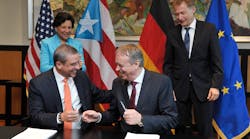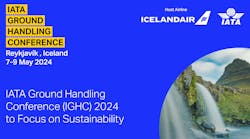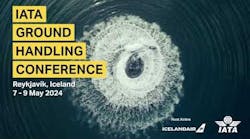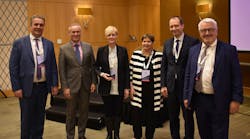October 7, 2014 – Aguadilla – Governor Alejandro García Padilla stressed today the importance of the development of the aircraft maintenance, reparation and reconditioning center in Aguadilla as the axis of a new industry that will consolidate the ongoing diversification of the Island’s economy.
In his remarks at the Aerospace Industry Forum, organized by the Aguadilla campus of the University of Puerto Rico, the Governor said the agreement signed a few months ago with Lufthansa Technick to create an aircraft maintenance, repair and reconditioning center (MRO) at old Ramey Base is one of the steps his Administration has taken to diversify the industrial base of Puerto Rico.
“We have to diversify. We can’t bet everything on just one industry. For too long, we have focused on the pharmaceutical industry. Manufacturing, especially drugs and medical devices, represent $46 billion of our gross internal product, almost half of our economy. We need to protect the jobs those industries provide, but we also have to reduce our dependence on those sectors. That’s what this effort is all about,” said García Padilla.
According to estimates, in 2019 the aviation and aerospace industry will contribute $600 million per year to the Island’s gross internal product and create 2,000 well-paid jobs. The MRO facility will have a ripple effect through the economy, and will benefit companies such as Honeywell and Pratt & Whitney, which produce airplane machinery, as well as small and medium-sized companies, from information technology firms to electrical wiring, supplies, welding companies and more. The economy of the northwestern towns and cities of the Island will also benefit from this industry.
García Padilla’s remarks were followed by a panel which included the participation of President of Lufthansa Technik Puerto Rico, Elmar Lutter; the President of the University of Puerto Rico, Uroyoán Walker, and the Secretary of the Department of Economic Development and Commerce of Puerto Rico, Alberto Bacó.
“The agreement between Lufthansa Technik and Puerto Rico increases the Island’s presence in the aerospace industry and the creation of highly-skilled jobs in a fast-growing sector of the world economy. Until now, the Island’s participation in this sector had centered in software development operations through alliances with companies such as Honeywell, Infotech, Lockheed-Martin, ESSIG Research, Florida Turbine and Axon. Choosing Puerto Rico as their investment place will give Lufthansa Technik the opportunity to expand their presence in the American market and to make good use of the great talents of the engineers and aviation mechanics we have in Puerto Rico,” said García Padilla.
According to estimates, the MRO world market will reach $76 billion in 2022. There are 20,000 airplanes operating today in the world; that number will increase to 34,000 in 20 years. To keep up with demand, airlines will have to invest $4.5 trillion in new aircraft. This means a higher demand for maintenance and reparation of airplanes. Projections are particularly positive for Latin America, where the MRO market is expected to grow 4.2 percent per year, a higher rate than the global average. Also, 30 percent of the planes operating in the area are Airbus A320, precisely the kind of aircraft Lufthansa will repair in Puerto Rico.
The University of Puerto Rico plays a crucial role in this industry, training professionals. “The main criteria for a company looking for a place to set up operations is the quantity and quality of skilled workers. Puerto Rico excels in that area. The University, working together with the Department of Education, has created a strategy to create the aviation mechanics school of the Department of Education at Ceiba. This school will be integrated in the efforts to develop the industry, and the University students are our main economic resource,” said García Padilla.





